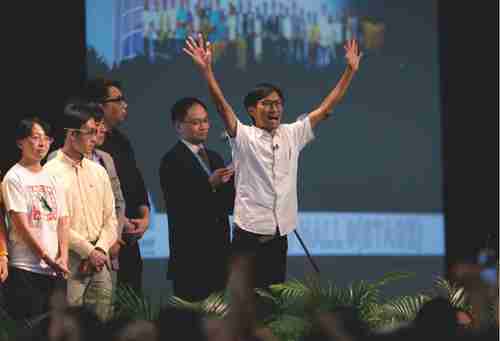This morning’s key headlines from GenerationalDynamics.com
- Sharply polarized Hong Kong electorate hands Beijing a stinging setback
- China’s relations with Hong Kong and Taiwan set to become more tense
Sharply polarized Hong Kong electorate hands Beijing a stinging setback

Radical activist candidate Eddie Chu Hoi-dick (right), celebrates after winning a seat at the legislative council elections in Hong Kong (Macau Daily Times)
Pro-democracy or “localist” candidates won 27 seats out of 70 in Sunday’s elections for the Legislative Council of Hong Kong (LegCo). Although these are not enough seats to push through new legislation, they are enough to veto important legislation that pro-Beijing factions had hoped to pass into law.
The 27 localist seats are even more significant when you consider that only 35 seats are directly elected by the voters. The other 35 seats are for “functional constituencies,” which are elected by elite voters in particular professions or trades, such as accounting, finance, medicine and fisheries, most of which support Beijing because their members have close ties to China’s Communist elite on the mainland.
China’s thuggish policies in Hong Kong have apparently backfired spectacularly, as the election handed a major setback to Beijing. Beijing had hoped that more seats would go to pro-Beijing candidates, but the opposite happened instead.
The turnout was almost as significant as the output. Some 2.2 million people voted, much more than in past elections, indicating increased polarization and an intense interest in both sides to “send a message.”
The term “localist” is new this year. It does not mean “pro-independence,” because being pro-independent is illegal. But it means more than “pro-democracy,” because the latter refers mostly to election rules, while “localists” advocate much more self-government, and much more independence from Beijing.
Before Sunday’s election, the pro-Beijing camp held 43 seats, and had hoped to increase that number to 47, giving them the two-thirds majority needed to pass constitutional reform, including laws that would give Beijing much more control over Hong Kong. Instead, the pro-Beijing camp now has only 40 seats, and the localists can veto any attempts at constitutional “reform” that would give more power to Beijing.
A statement from Beijing emphasized that any talk of “Hong Kong independence” was against the Constitution of China, the Basic Law, and relevant laws of Hong Kong. The statement accused “certain organizations and candidates” of publicly advocating for “Hong Kong independence,” and it called on the Hong Kong authorities to punish these individuals and “to mete out penalties according to law.” South China Morning Post (Hong Kong) and Macau Daily Times and Xinhua and BBC
China’s relations with Hong Kong and Taiwan set to become more tense
During Mao’s bloody Communist Revolution, Hong Kong was a British colony, and many people fled to Hong Kong in the late 1940s to escape Mao’s atrocities. Many remained in Hong Kong, while many others continued on to the island of Formosa, now known as Taiwan. As the survivors of Mao’s revolution have died off over the decades, and younger generations have come of age, the populations of both regions have become more polarized and more tense.
In the past few years, we have seen China become increasingly nationalistic and militarized. In the South China Sea, China is building artificial islands and military bases in waters that a United Nations court recently ruled were the territorial waters of the Philippines. China is making it clear that it does not recognize any international authority except its own self-interest, and that it will use its increasingly powerful military to crush any opposition.
So in China’s mainland, young people are increasingly demanding military action against Hong Kong and Taiwan, while on Hong Kong and Taiwan, young people are increasingly demanding complete independence from China.
China has suffered major electoral setbacks in both regions this year. In January, Taiwan’s pro-independence party won an overwhelming victory, and now on Sunday, Hong Kong’s localist activists have won a very significant victory.
In both Taiwan and Hong Kong, “independence” is a forbidden word, and Beijing has said it will violently crush anyone who even talks about it. But pro-independence sentiments are growing in both regions, while nationalist sentiments are growing in China’s mainland. Anyone can see that this won’t end well. South China Morning Post (Hong Kong) and Chatham House (UK) and Manila Times
Related Articles
- China’s ‘thuggery’ transforms Hong Kong’s Umbrella Movement into independence movement (30-Aug-2016)
- Taiwan’s pro-independence party wins historic presidential election (17-Jan-2016)
- Taiwan voters choose independence from China (30-Nov-2014)
KEYS: Generational Dynamics, China, Hong Kong, localist, Legislative Council of Hong Kong, LegCo, Mao Zedong, Communist Revolution, Taiwan
Permanent web link to this article
Receive daily World View columns by e-mail

COMMENTS
Please let us know if you're having issues with commenting.